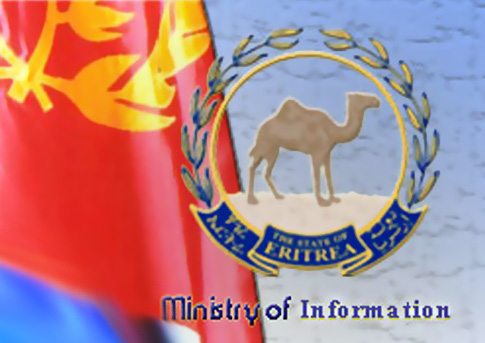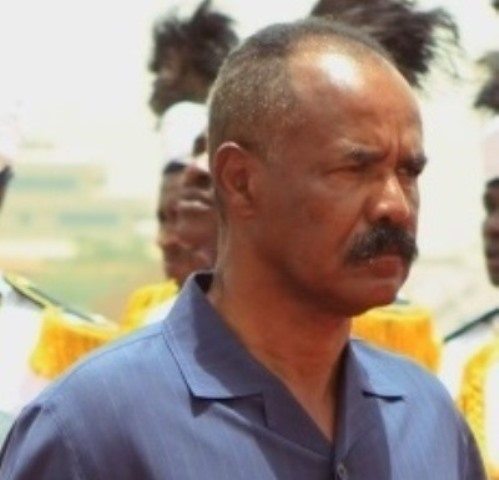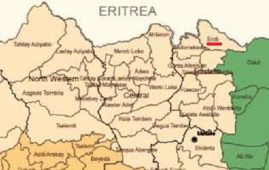A leaked US Embassy Cable of Sept. 2005, classified as ‘Confidential’, shows opposition leader Berhanu Nega(PhD) contemplating a street violence that would result in the shooting of 1,000 people per day to force the government share power.
Berhanu Nega was one of the top leaders of an opposition Coalition for Unity and Democracy (CUD) that won the capital city by a landslide in the May 2005 election.
On Sep. 26, 2005, Berhanu Nega called on the US Embassy in Addis ‘to discuss political tensions in the run-up to the opposition’s planned demonstrations on Oct. 2.’ Berhanu attended the meeting alone, while the US Embassy was represented by Amb. Huddleston, ADCM, USAID Director and Political and Economic Chief of the Embassy.
In the meeting, Berhanu Nega denied that CUD Chairman Hailu Shawel had called for ‘bringing down the government’ in a public statement the recent statements in the U.S. a few weeks earlier. However, the Embassy officials corrected him stating that United States government observers had heard the statements and believed they provoked a strong reaction from the government.
Yet, Berhanu insisted that the opposition wants a ‘government of national unity’, thus CUD demonstrations or strikes are aimed to that.
The Cable notes that:
this demand [for a ‘government of national unity’] was based on the opposition’s continuing belief that it had won the May 15 elections, and that only a government of national unity would have the moral and political authority to organize new elections and institutional reforms over a two-year period. Chargé [d’ affaires] told Berhanu that the USG and Carter Center did not believe that the opposition had won and did not view a government of national unity as a realistic objective
[Notice that: The Embassy only mentioned the Carter Center, not the EU Observers team lead by Ana Gomez, because the latter ‘leaked’ a paper, on the evening of the polling day, that suggested the opposition had a ‘lead’ . Though, Ana Gomez continue to insist, to date, that the leak was not deliberate and ‘no one knows who won the election’ mantra, many observers believe she has the blood of Ethiopian youth on her hands, as her actions were contributed to the post-election violence.]
In the meeting, Berhanu Nega told the Embassy officials that ‘the only way to change the GOE’s approach to the opposition and democratic institutions would be through strong popular pressure, like the planned demonstration or a strike.’
When Embassy officials tried to bring sense out of him by asking ‘how the opposition could consolidate its gains and press its agenda if its leaders were in jail or underground.’
Berhanu Nega answered:
why do you assume that the government would win? We may be risking a lot, but the government is risking even more. They could arrest our leaders and shoot 1,000 people a day, but how long could they continue to do that?
Curiously, the Cable claims that ‘Berhanu Nega was less combative and more cordial than on previous occasions.’ In fact, Berhanu Nega indicated in the meeting that he is among ‘the moderates’ in the opposition camp.
If a ‘less combative’ and ‘moderate’ Berhanu Nega would gambles on the shooting of a 1000 people per day,……
Epilogue: Berhanu Nega’s party ultimately called for a street violence in Nov. 2005, in a public statement outlining a various forms of protest, including some specific actions targeting members of a specific ethnic group and political party. Neither the ethnic clash, nor the shooting of 1000 per day materialized, though the street riots left 196 persons, including police officers, dead. The leaders of CUD were detained and charged and convicted in an Ethiopian Court, observed by US and EU diplomats and lawyers. However, they were released on June 2007 when the President of the Republic accepted their petition for pardon, in which they took responsibility for the loss of life and property.
Months after the pardon, Behanu Nega went to the United States and established an organization, Ginbot 7, that openly advocates violence. In 2009, he masterminded a foiled plot to assassinate government officials, consequently he was sentenced to death in absentia, while Ginbot 7 was proscribed as a terrorist organization.
Berhanu Nega continues to work officially with the Eritrean Government and another home-grown terrorist group, OLF, which plotted the foiled plan to bomb AU Summit last January, according to a UN report.
Read the full text of the Cable below.
**********************
Reference ID – 05ADDISABABA3425
Created – 2005-09-28 11:40
Released – 2011-08-30 01:44
Classification – CONFIDENTIAL
Origin – Embassy Addis Ababa
This record is a partial extract of the original cable. The full text of the original cable is not available.
C O N F I D E N T I A L SECTION 01 OF 03 ADDIS ABABA 003425
SIPDIS
E.O. 12958: DECL: 09/27/2015
TAGS: PGOV PREL PHUM ET ELEC UNREST
SUBJECT: ETHIOPIA: CUD’S BERHANU ON OCT. 2 DEMONSTRATION, POSSIBLE STRIKE
REF: A. ADDIS ABABA 3276
¶B. ADDIS ABABA 3382
¶C. ADDIS ABABA 3250
Classified By: Charge Vicki Huddleston for reason 1.4 (b,d).
¶1. (C) Summary: CUD leader and Addis mayor-elect Berhanu Nega told Charge Sept. 26 that if the GOE denies permission for the demonstration the opposition has called for Oct. 2, the CUD and UEDF plan to stand down, but instead call an immediate general strike in which people would stay at home. Charge urged that the CUD comply fully with any GOE decision to prohibit the demonstration in order to avoid bloodshed. Berhanu argued that the ruling coalition will only reverse its steady backsliding on democracy under concerted popular pressure. The CUD leader reiterated that the opposition was unlikely to take its seats in parliament unless government harassment ceased and the GOE agreed to a dialogue concerning the country’s democratic institutions prior to the seating of Parliament. Charge said that the opposition had much to lose and little to gain by boycotting parliament. Berhanu criticized the lack of international pressure on the GOE concerning harassment and human rights violations, and expressed skepticism that PM Meles would really engage in dialogue once the opposition had entered parliament. Berhanu appears to be looking for alternatives to confrontation, but has yet to find sufficient political cover to appease his constituencies. GOE appears to be hardening its position as a scheduled meeting between Mayor Arkebe and Berhanu to review plans for turning over City Hall was canceled shortly after the Opposition request permission to demonstrate in Maskel Square and in 30 other towns around the country on October 2. If the Opposition calls off the demonstration or it is relatively peaceful the difficult process toward seating Parliament will continue. Summary.
¶2. (C) Berhanu Nega called on the Charge Sept. 26 to discuss political tensions in the run-up to the opposition’s planned demonstrations on Oct. 2. Berhanu formerly served as the vice president of the opposition Coalition for Unity and Democracy (CUD), but recently stepped down from his formal party office in preparation for taking over as mayor of Addis Ababa. Septel discusses the CUD’s reconstitution as a unified political party. Berhanu attended the meeting alone, and was less combative and more cordial than on previous occasions (ref. A). ADCM, USAID Director and Pol/Econ Chief accompanied Amb. Huddleston.
If Demonstration is Nixed, Opposition Will Call General Strike
——————————————— —————–
¶3. (C) Charge asked Berhanu for a status report on opposition plans for a large demonstration on Oct. 2. She reiterated USG concerns about the potential for violence, and asked what the opposition would do if, as expected, the Addis city government turned down their request for a demonstration permit. Berhanu confirmed that the CUD had requested permits that afternoon (Sept. 26) not just in Addis, but in some 30 locations throughout the country. He confirmed that the Addis demonstration was planned for the capital’s large central plaza, Meskal Square, and would not march elsewhere. Berhanu questioned on what legal basis the permits could be denied, but nonetheless indicated that opposition leaders would call off the demonstrations if they were deemed illegal. He hastened to add that if demonstrations were not permitted, CUD and UEDF leaders planned to "ask people to stay home" beginning Oct. 3. The Charge welcomed the news that the CUD would comply with any GOE prohibition of the demonstration, and urged that opposition leaders communicate that message clearly to its followers by all available means. Berhanu agreed, while noting ironically that state media had refused to broadcast such a message from the CUD prior to the deadly June 8 demonstrations.
Berhanu: GOE Will Only Democratize Under Pressure
——————————————— —
¶4. (C) When the Charge asked Berhanu to explain the strategy of the opposition, Berhanu replied that the ruling coalition had been totally surprised by the initial results of May 15 elections and had spent the last four months trying to close the democratic opening it had begun during the campaign. For example, the EPRDF had passed a restrictive new set of rules on the parliamentary opposition as soon as it became clear that the CUD and UEDF would have around 200 seats in the new assembly, he said. The new rules were designed to keep parliament as fully controlled and irrelevant as it had been previously. Berhanu also cited the increasing harassment to which opposition parties were being subjected, including the seizure of the Oromo National Congress (ONC) office by a government-engineered splinter group. (Note: the ONC is the largest party in the UEDF coalition.) He also mentioned the arrest on Sept. 26 of some 40 CUD members in the Amhara region, claiming that the gun-holding CUD personnel were actually the gate guards from party offices throughout the region.
Why Do You Assume They’ll Win a Showdown?
—————————————–
¶5. (C) Given this sort of GOE behavior, Berhanu argued that it made little sense for the opposition to simply accept its seats in parliament. He emphasized that he had repeatedly sought out long-time contacts in the ruling party to seek a dialogue to address opposition concerns, but to no avail. The only way to change the GOE’s approach to the opposition and democratic institutions would be through strong popular pressure, he said, like the planned demonstration or a strike. When emboffs questioned how the opposition could consolidate its gains and press its agenda if its leaders were in jail or underground, Berhanu asked, "why do you assume that the government would win? We may be risking a lot, but the government is risking even more. They could arrest our leaders and shoot 1,000 people a day, but how long could they continue to do that?" Berhanu later retreated, saying that the CUD did not want violence and did not want to see anyone die, and for that reason would not pursue a demonstration without legal permission.
What’s the CUD Agenda?
———————-
¶6. (C) Berhanu denied that CUD Chairman Hailu Shawel had called for "bringing down the government" in the recent statements in the U.S. (ref B). Charge and others replied that USG observers had heard the statements and believed they invited a strong GOE reaction. Berhanu indicated that CUD demonstrations or strikes would reiterate the opposition’s call for a government of national unity. This demand was based on the opposition’s continuing belief that it had won the May 15 elections, and that only a government of national unity would have the moral and political authority to organize new elections and institutional reforms over a two-year period. Charge told Berhanu that the USG and Carter Center did not believe that the opposition had won and did not view a government of national unity as a realistic objective.
¶7. (C) The mayor-elect acknowledged that the EPRDF had emphatically rejected calls for a national unity government. He indicated that in an eventual private dialogue with the GOE, the opposition would be prepared to accept an EPRDF government for the next five years. What the opposition needed, however, were guarantees that future elections would be truly fair, that it would be able to participate meaningfully in parliament, and that other institutional weaknesses would be addressed. Emboffs argued that parliament was the place to pursue this agenda, and that the international community would be engaged with Ethiopian institutions to assist with democratic reforms. Berhanu expressed skepticism that the international community would be any more effective in checking government abuses in the future than it had been during the election dispute thus far. He pointed to the alleged failure of the Donors’ Group to ensure follow up on negotiations to create a "conducive environment" under a ten-point plan for investigating electoral complaints. He also questioned the effectiveness of providing money to develop the capacity of the new parliament if the GOE remained bent on stifling multi-party debate. "Remember that the EPRDF are masters at delay, divide and rule," he warned.
¶8. (C) When asked what would be sufficient confidence-building measures to bring the opposition into parliament, Berhanu answered that a negotiated series of commitments to end harassment and make key democratic institutions truly independent, whose implementation would be monitored by ad-hoc commission outside parliament, would adequately address opposition concerns. The mayor-elect alluded to differences of opinion within the opposition, but suggested that a dialogue with the government along the above lines would enable moderates (like him) to resolve the electoral dispute. Berhanu predicted that if the opposition took its seats in the absence of some concessions from PM Meles, however, much of its base would abandon existing parties in favor of more radical alternatives.
Where is International Community on Human Rights?
——————————————— —-
¶9. (C) Berhanu again bemoaned what he considered misguided activism by the international community. Rather than simply urging the opposition to accept its parliamentary seats with no conditions, why didn’t the U.S. and the rest of the international community apply more pressure on the GOE to end harassment and other human rights violations, he asked? Pol/Econ Chief referred Berhanu to tough language on these issues in the recent Ambassadors’ Donors Group statement (ref C). Charge also assured Berhanu that she and other local ambassadors would continue to press PM Meles for an end to harassment — which they knew was indeed occurring — as well as outreach to the opposition.
Comment: Encouraging Signs, But No Compromise in Sight
——————————————— ———
¶10. (C) The basic disagreement — dialogue before parliament, or parliament before dialogue remains — remains, and no direct channels of communication between the opposition and the EPRDF appear open. However, if we get past the October 2 demonstration it may ease the pressure allowing PM Meles to call for democracy and dialogue. Although high levels calls from the UN, EU and Washington are important and needed, Meles may find it difficult to reach out as he has to demonstrate his strength to his partisans and — possibly — to his northern neighbors. HUDDLESTON
**********************
Check the Wikileaks Archive for previous and forthcoming posts.






Greetings Daniel,
Thanks for your response. My comment wasn’t about the semantics; I think Berhanu’s comment reflected his belief about how the government would respond to a peaceful popular protest. But we can disagree on that.
On the second point, I think the embassy’s assessment is pretty clear and I don’t think I took anything out of context or stretched its meaning. Unless one believes the embassy makes up stories and sends them to the State Department with particular goals in mind, I see no grounds on which to doubt its statement. An alternative argument that sees the embassy as a separate unit which tries to get the State Department to grant visas or do other things by altering its assessments, would just lead us to the conclusion that nothing in these cables is to be trusted.
I don’t think a reading of the cables directly related to the CUD trials leads to a very different conclusion from the above either. A brief summary based on my reading is that the US embassy believed the case for the most serious charges was not made by the prosecution and further more, the embassy saw the trials as “part of a larger political process.”
My friend. Thank you for sharing your view.
1. As you said, “he contemplated that the government might kill a 1000 people a day.” That is the whole point.
He considered it an acceptable or affordable cost to put him in power.
By the way, I used the word ‘pondered’, you used ‘contemplated’. I don’t see much difference, if any at all.
2.I noted that “US and EU diplomats and lawyers” observed the trial to emphasize it was an OPEN TRIAL.
I am not seeking an approval from them. Otherwise, why do we need a court?
By the way, not everyone agrees with the decision of a court. But it should be held in open, so that everyone could criticizes it, plus the judges and witnesses would feel the pressure of public scrutiny.
By the way, the Cable you cited is written after the release of CUD leaders and to convince the State Department would allow a visa to them, despite the crime conviction.
It is not analysis of the trial, the evidences, the witnesses….etc.
So..you took it completely out of context and stretched it beyond its meaning.
This is why, I always post the full text of a Cable.
Thanx for sharing your view and keep in touch.
I think a correct reading would be he contemplated that the government might kill a 1000 people a day.
There was a CUD call for street violence? really? Maybe some evidence might be more convincing.
In any case, as long as you are using the presence of “US and EU diplomats and lawyers” to legitimize the court proceedings, I hope you will also cite the cable which says “in Post’s opinion, the evidence presented by the federal prosecution did not in any way prove that the defendants had any role in leading, organizing or taking part in the demonstrations of 2005, and that the verdicts concluded what was an entirely political trial for the CUD leadership. ” (http://wikileaks.org/cable/2007/08/07ADDISABABA235.html)
shame …shame on Birhanu